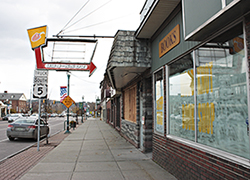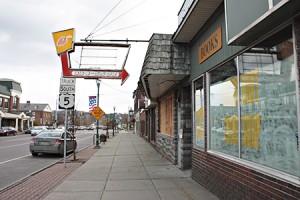

copyright the Chronicle November 19, 2014
by David Dudley
NEWPORT — Victoria Kuhn, a thin woman in her twenties, moved to Newport a little over a year ago with her fiancé. Since their arrival, they have lived on Prouty Beach, in their car, and during the cold months, with the man’s mother. Ms. Kuhn’s fiancé suffered a traumatic brain injury and Post Traumatic Stress Disorder while in the military. Since his return, he has developed severe stomach ulcers, and doctors have given him six months to live, Ms. Kuhn said.
“We came to Newport from Dover, Delaware,” she said. “We wanted to be near his mother, but we couldn’t find our own place to live.
“We’ve been here a little over a year now, and still haven’t found our own home. I don’t know how to explain it. ”
Ms. Kuhn and her fiancé are among the Northeast Kingdom’s homeless, a population whose numbers are hard to put a finger on.
In the warmer months of June, July and August, there were nearly 75 applications for emergency housing, a number that’s expected to spike as the weather turns cold, said Shaun Donahue, field director at the Agency for Human Services.
But he added that it’s not possible to say just how many people in the area are homeless.
For one thing, the Northeast Kingdom’s homeless are far less visible than homeless people might be in a more urban area.
People in the latter group often set themselves up in pedestrian pathways. They advertise their homelessness in an effort to procure money. Anyone who’s lived in the city, or even visited, has seen them.
The homeless population in the Northeast Kingdom, especially in the Newport area, often goes unseen. Despite the severe weather, there are no shelters for the homeless in Newport.
Newport City Councilman Neil Morrissette said many of the homeless in the area are sleeping on someone’s couch. Others are forced into tent cities that are far removed from the public eye.
“Whether you’re staying with a friend, a relative, or in your car, you’re homeless,” Mr. Morrissette said. “That makes it easy for us to forget that they are out there, and that they need help.”
Doubling up — a term referring to a “low-income individual or family living with friends, extended family, or other non-relatives due to economic hardship” — increased 56 percent in Vermont between 2009 and 2010, according to a U.S. Census Bureau report. To put that into perspective, the rest of the U.S. saw a 12 percent increase.
Although there are many reasons, two stand above all others: Unemployment, and for those who are employed, low wages.
Newport City Manager John Ward said he feels that some homeless people don’t want to work, and are thus homeless by choice.
“The state makes it far too easy for people from other states to move to Vermont, and get on public assistance,” Mr. Ward said. “Don’t get me wrong, we’re not against helping the poor. Some are caught in a rut, and we understand that. But there are some, some who don’t want to work. Like nestlings, they need a little push to get out of the nest.”
Mr. Ward acknowledges that some people simply aren’t ready to be on their own, for various reasons.
Likewise, Newport City Mayor Paul Monette said he feels that the taxpayers of Newport are already overburdened and should not carry the lion’s share of providing for the region’s homeless.
“I strongly believe that each community should deal with the issue locally,” Mr. Monette said via e-mail. “The regional issue of homelessness in the Northeast Kingdom cannot fall solely upon Newport City. We are the county seat; most of the service agencies are located here, but we can’t do it all. We need others — state and federal governments, social clubs and service agencies — to help us solve this issue.”
And to some degree, communities are stepping up. A number of churches offer food to the needy. Places like NEKCA offer a wide range of services to poor people. And a few local motels work with the Agency of Human Services to provide emergency housing.
Then, of course, there are those who have extra space in their homes, people who willingly double up.
“We met someone on July 4, and they offered us a space in their place,” Ms. Kuhn said.
“Without that, I don’t know what we would do. We’re just out of options.”
Ms. Kuhn claims that she has been looking for work.
“I’ve applied to so many places,” she said. “It seems like every place I’ve ever applied to, they were in the process of laying people off.”
“There’s a certain stigma around homeless people,” Mr. Morrissette said. “But the truth is, so many people are in desperate need of assistance. The stigma makes things so much worse. To the point where homeless people themselves are afraid to admit that they are homeless.”
Christine Tetlow of Manchester, New Hampshire, has lived at a local motel since her domestic partner allegedly tried to kill her three weeks ago. A hard worker throughout her adult life, she understands the stigma.
“I had two or three jobs at any given time while I was raising my kids in Massachusetts,” Ms. Tetlow said. “I was a personal care attendant for 17 years. Before that I was in housekeeping.”
She lived in Vermont for roughly six years with her partner. Though he provided for their living expenses, he was abusive, she alleges.
“People judge you, when you’re homeless,” Ms. Tetlow said. “It has been so hard to get back on my feet. I’m trying to come to terms with living alone, but I’m caught in a vicious circle. Every time I try to get away, he pops back up. But how am I supposed to ever really escape him, if I can’t get my own place?
“I feel like a charity case in my own head.”
Ms. Tetlow said that NEKCA has a program that will cover her first month’s rent and the security deposit if she finds an apartment.
That might be easier said than done.
According to “Housing Spotlight: The Affordable Rental Housing Gap Persists,” a report by the Vermont Affordable Housing Coalition, and the National Low Income Housing Coalition, there were just 39 rental homes affordable and available to every 100 extremely low income households in Vermont in 2012.
“Extremely low income households” are defined as those in which the income is $21,000 a year, or less.
The report goes on to say that it’s nearly impossible to find housing for Vermonters who receive Supplemental Security Income (SSI), which is generally paid to adults and children with disabilities, and some people 65 or older.
According to the report, those renters are deeply low income. There are a mere 11 affordable and available apartments for every 100 households in that income group.
That has only worsened since the housing crisis in 2008.
According to spotlightonpoverty.org, there were 1,160 homeless people in the state of Vermont in 2012, the most recent year for which data is available.
The Committee on Temporary Shelter in Burlington asserts that Vermont has the highest rate of homelessness in New England.
In Vermont, 23 percent of the employed workforce earned $24,999 or less, according to the U.S. Census Bureau. What does that mean for those who rent?
“It means that many employed people are living check to check,” Mr. Morrissette said. “They are one paycheck away from homelessness.”
If they get laid off, or their car breaks down, the next step could be moving in with a family member, or a friend. They could join those people who are doubling up to avoid sleeping in the streets.
“It could happen to anybody,” Mr. Morrissette continued. “And that’s why we need to invest time and effort into these services that prevent people from becoming homeless.”
Those who are homeless aren’t necessarily a danger to anyone, Newport Police Chief Seth DiSanto said.
“Mostly they keep to themselves,” he said. “Mostly, when we come into contact with them, we’re checking for their well-being.”
Chief DiSanto pointed out that Newport Police Department officers primarily deal with people in need when they are vulnerable to the elements.
“Mostly, our guys are connecting the homeless with the resources they need,” he said. “Between our 211 line and NEKCA, we come through for them 99 percent of the time.”
Vermont’s 211 line is not an emergency line like 911. It’s a number to call to find out about services ranging from emergency food and shelter, to counseling, to transportation and legal assistance.
Mr. Donahue at the Agency of Human Services said that, with the homeless in the area mostly out of sight, it’s difficult to come up with specific numbers.
“I can’t say exactly how many people in Newport are homeless,” he said. “Really, we won’t know until the cold sets in. Then we’ll start seeing a spike in emergency housing requests.”
During the months of July, August, and September of this year, Mr. Donahue said he received 73 applications for emergency housing. Of those, 38 were families, and 35 were individuals.
“Most people make do in the warm months by camping out and living in their cars,” he said. “When winter comes, it’ll be a different story.”
“We lived in our car for a few months,” Ms. Kuhn said. “There’s no shelter in Newport. There’s nowhere else to go.”
Mr. Donahue and Mr. Morrissette agree that Newport is in need of a warming shelter.
“What’s tough for folks is: Where can you go?” Mr. Donahue said. “We’ve only got a couple of motels in the area that are willing to accept the people we serve. There’s a real shortage.”
Mr. Morrissette said he feels that ignoring the problem only makes it worse.
“We had a news crew here about a year ago,” he said. “They covered this woman living in a storage shed, and then they decided not to run the story. They said the problem wasn’t so bad. But I feel that, if there’s one person sleeping outside during sub-zero weather, that’s too many.”
Especially in a county that doesn’t have a shelter for the homeless. Though the idea has been bandied about for some time, there hasn’t been any real progress towards establishing one. .
“I don’t want to blame it on one person, or one organization, because it’s a societal issue,” Mr. Morrissette said. “It’s caused by certain societal conditions, and it will take a society to solve the issue.”
The first thing, he said, is to begin dialogues about homelessness.
“Accept that it does exist, and that most homeless people are not homeless by choice,” Mr. Morrissette continued. “We’ve got to come together as a community and help those who can’t help themselves.”
A number of organizations offer services to those who are experiencing economic hardship. Those seeking services, and those who wish to volunteer, can visit NEKCA, the Vermont Department of Economic Services, Umbrella (in St. Johnsbury), and Life in Christ Church.
contact David Dudley at [email protected]
For more free articles from the Chronicle like this one, see our Editor’s Picks pages. For all the Chronicle’s stories, subscribe:
Print subscription
Annual online subscription
Short-term online subscription







